Pharmacy Report: Healthcare Professional Responsibilities and Errors
VerifiedAdded on 2023/01/03
|6
|1316
|299
Report
AI Summary
This report examines the responsibilities of healthcare professionals, including registered nurses, doctors, and pharmacists. It delves into the role of each professional in maintaining patient records, diagnosing illnesses, prescribing medications, and providing patient counseling. The report further analyzes medication errors, exploring human error and system-focused approaches to error reduction. It discusses the 'Swiss Cheese Model' and its application in preventing errors, along with latent and active failures contributing to medication errors. Factors such as inadequate drug knowledge, patient characteristics, and poor communication are identified as causes of medication errors, with corresponding strategies for prevention. The report references several studies to support the findings and recommendations.
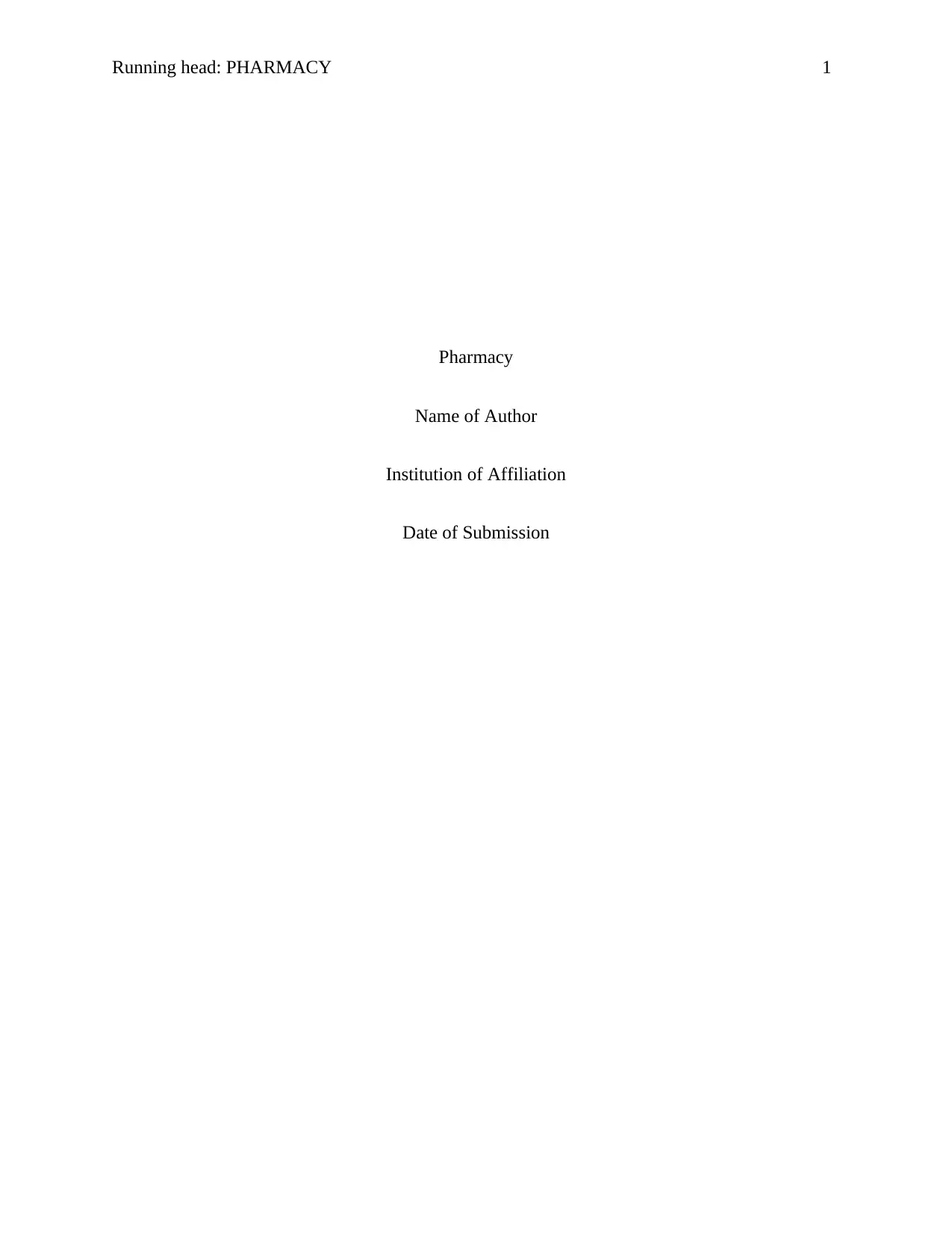
Running head: PHARMACY 1
Pharmacy
Name of Author
Institution of Affiliation
Date of Submission
Pharmacy
Name of Author
Institution of Affiliation
Date of Submission
Paraphrase This Document
Need a fresh take? Get an instant paraphrase of this document with our AI Paraphraser
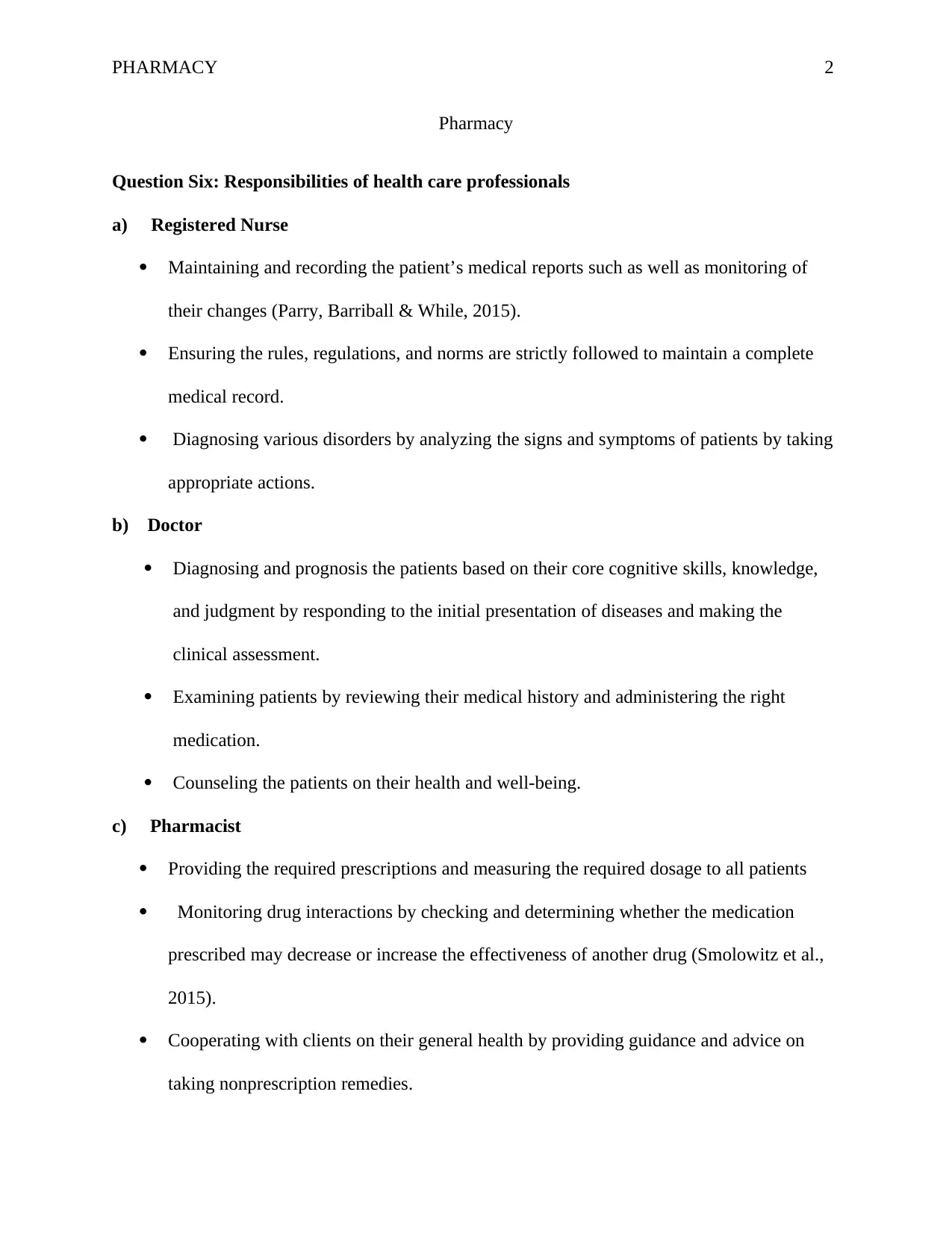
PHARMACY 2
Pharmacy
Question Six: Responsibilities of health care professionals
a) Registered Nurse
Maintaining and recording the patient’s medical reports such as well as monitoring of
their changes (Parry, Barriball & While, 2015).
Ensuring the rules, regulations, and norms are strictly followed to maintain a complete
medical record.
Diagnosing various disorders by analyzing the signs and symptoms of patients by taking
appropriate actions.
b) Doctor
Diagnosing and prognosis the patients based on their core cognitive skills, knowledge,
and judgment by responding to the initial presentation of diseases and making the
clinical assessment.
Examining patients by reviewing their medical history and administering the right
medication.
Counseling the patients on their health and well-being.
c) Pharmacist
Providing the required prescriptions and measuring the required dosage to all patients
Monitoring drug interactions by checking and determining whether the medication
prescribed may decrease or increase the effectiveness of another drug (Smolowitz et al.,
2015).
Cooperating with clients on their general health by providing guidance and advice on
taking nonprescription remedies.
Pharmacy
Question Six: Responsibilities of health care professionals
a) Registered Nurse
Maintaining and recording the patient’s medical reports such as well as monitoring of
their changes (Parry, Barriball & While, 2015).
Ensuring the rules, regulations, and norms are strictly followed to maintain a complete
medical record.
Diagnosing various disorders by analyzing the signs and symptoms of patients by taking
appropriate actions.
b) Doctor
Diagnosing and prognosis the patients based on their core cognitive skills, knowledge,
and judgment by responding to the initial presentation of diseases and making the
clinical assessment.
Examining patients by reviewing their medical history and administering the right
medication.
Counseling the patients on their health and well-being.
c) Pharmacist
Providing the required prescriptions and measuring the required dosage to all patients
Monitoring drug interactions by checking and determining whether the medication
prescribed may decrease or increase the effectiveness of another drug (Smolowitz et al.,
2015).
Cooperating with clients on their general health by providing guidance and advice on
taking nonprescription remedies.
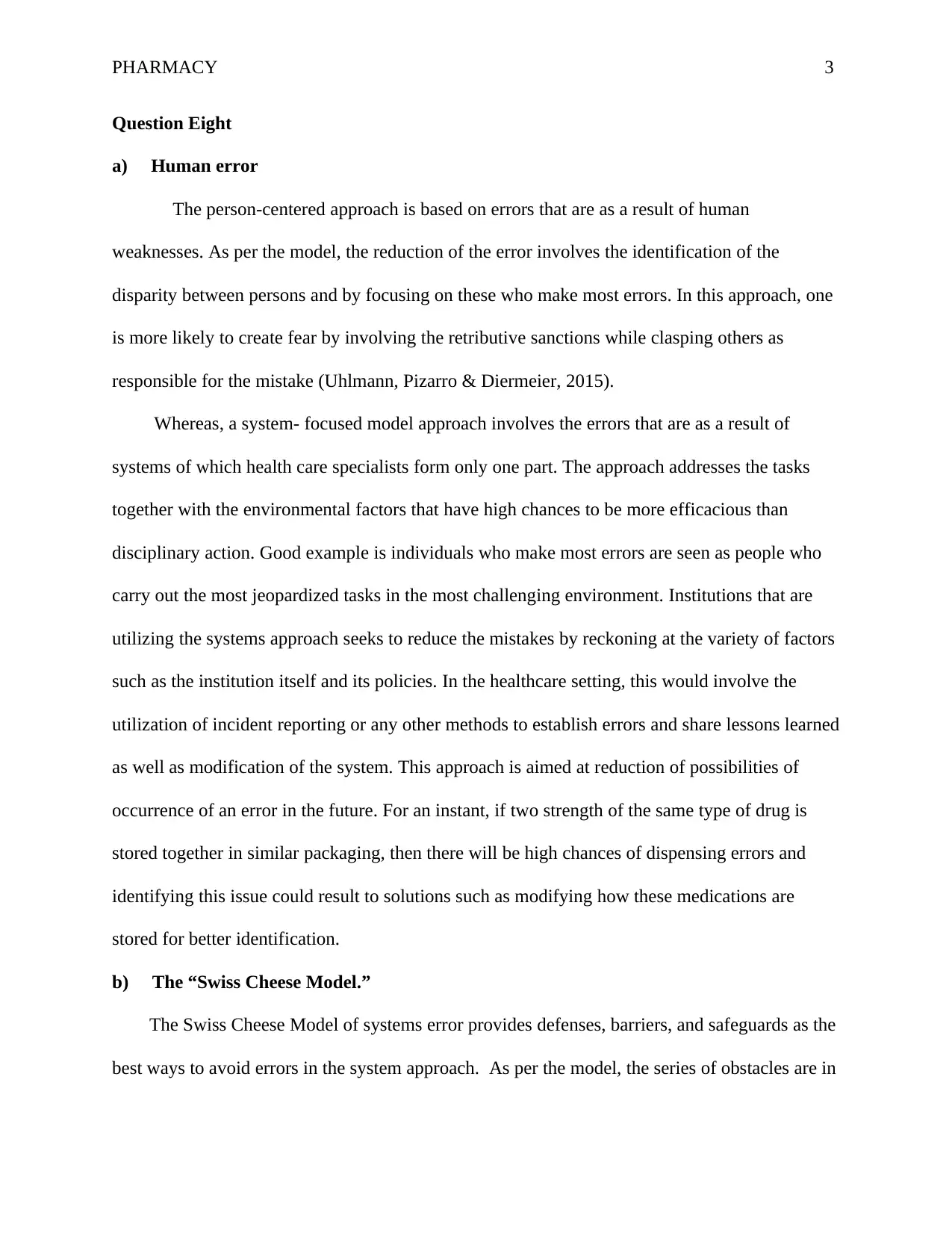
PHARMACY 3
Question Eight
a) Human error
The person-centered approach is based on errors that are as a result of human
weaknesses. As per the model, the reduction of the error involves the identification of the
disparity between persons and by focusing on these who make most errors. In this approach, one
is more likely to create fear by involving the retributive sanctions while clasping others as
responsible for the mistake (Uhlmann, Pizarro & Diermeier, 2015).
Whereas, a system- focused model approach involves the errors that are as a result of
systems of which health care specialists form only one part. The approach addresses the tasks
together with the environmental factors that have high chances to be more efficacious than
disciplinary action. Good example is individuals who make most errors are seen as people who
carry out the most jeopardized tasks in the most challenging environment. Institutions that are
utilizing the systems approach seeks to reduce the mistakes by reckoning at the variety of factors
such as the institution itself and its policies. In the healthcare setting, this would involve the
utilization of incident reporting or any other methods to establish errors and share lessons learned
as well as modification of the system. This approach is aimed at reduction of possibilities of
occurrence of an error in the future. For an instant, if two strength of the same type of drug is
stored together in similar packaging, then there will be high chances of dispensing errors and
identifying this issue could result to solutions such as modifying how these medications are
stored for better identification.
b) The “Swiss Cheese Model.”
The Swiss Cheese Model of systems error provides defenses, barriers, and safeguards as the
best ways to avoid errors in the system approach. As per the model, the series of obstacles are in
Question Eight
a) Human error
The person-centered approach is based on errors that are as a result of human
weaknesses. As per the model, the reduction of the error involves the identification of the
disparity between persons and by focusing on these who make most errors. In this approach, one
is more likely to create fear by involving the retributive sanctions while clasping others as
responsible for the mistake (Uhlmann, Pizarro & Diermeier, 2015).
Whereas, a system- focused model approach involves the errors that are as a result of
systems of which health care specialists form only one part. The approach addresses the tasks
together with the environmental factors that have high chances to be more efficacious than
disciplinary action. Good example is individuals who make most errors are seen as people who
carry out the most jeopardized tasks in the most challenging environment. Institutions that are
utilizing the systems approach seeks to reduce the mistakes by reckoning at the variety of factors
such as the institution itself and its policies. In the healthcare setting, this would involve the
utilization of incident reporting or any other methods to establish errors and share lessons learned
as well as modification of the system. This approach is aimed at reduction of possibilities of
occurrence of an error in the future. For an instant, if two strength of the same type of drug is
stored together in similar packaging, then there will be high chances of dispensing errors and
identifying this issue could result to solutions such as modifying how these medications are
stored for better identification.
b) The “Swiss Cheese Model.”
The Swiss Cheese Model of systems error provides defenses, barriers, and safeguards as the
best ways to avoid errors in the system approach. As per the model, the series of obstacles are in
⊘ This is a preview!⊘
Do you want full access?
Subscribe today to unlock all pages.

Trusted by 1+ million students worldwide
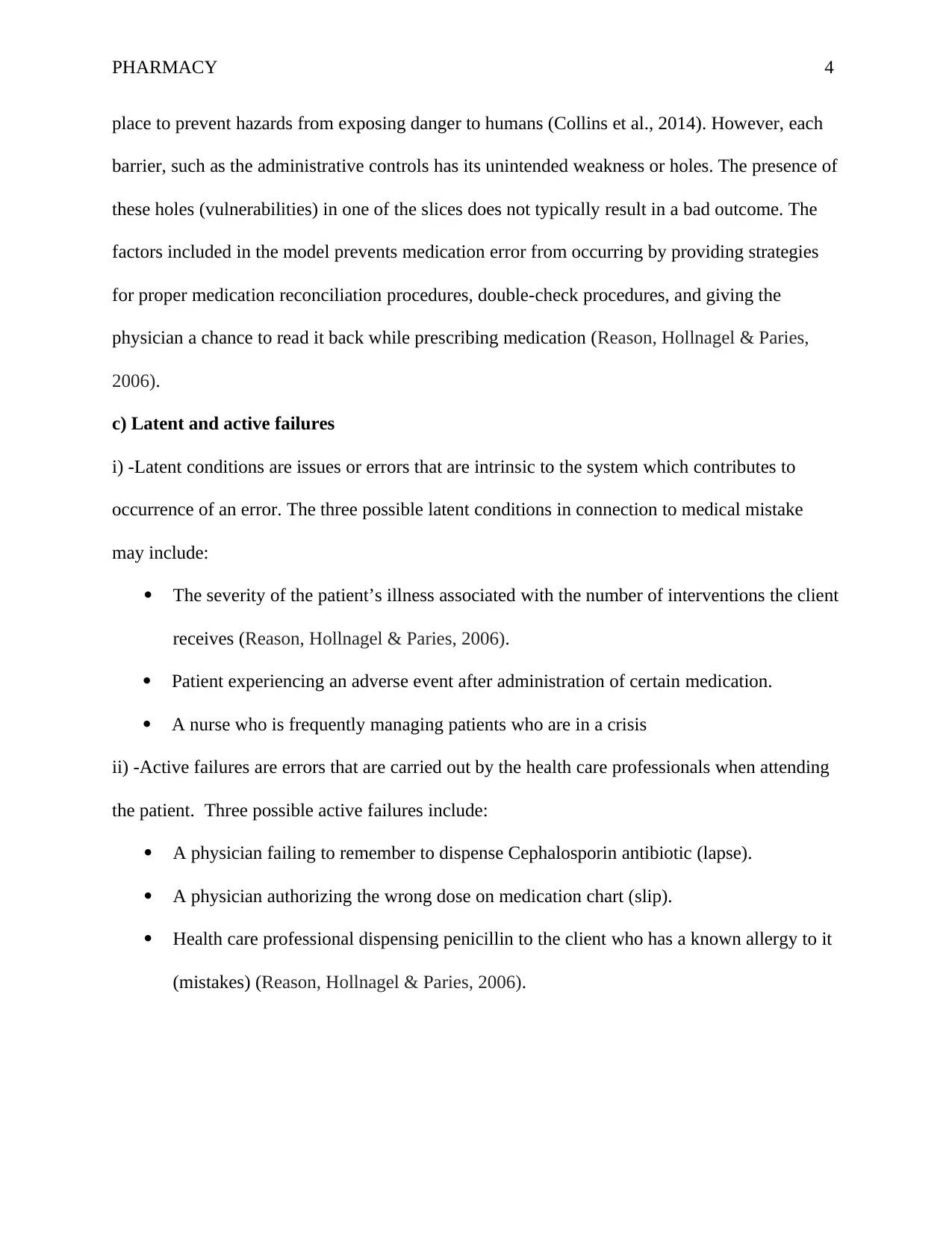
PHARMACY 4
place to prevent hazards from exposing danger to humans (Collins et al., 2014). However, each
barrier, such as the administrative controls has its unintended weakness or holes. The presence of
these holes (vulnerabilities) in one of the slices does not typically result in a bad outcome. The
factors included in the model prevents medication error from occurring by providing strategies
for proper medication reconciliation procedures, double-check procedures, and giving the
physician a chance to read it back while prescribing medication (Reason, Hollnagel & Paries,
2006).
c) Latent and active failures
i) -Latent conditions are issues or errors that are intrinsic to the system which contributes to
occurrence of an error. The three possible latent conditions in connection to medical mistake
may include:
The severity of the patient’s illness associated with the number of interventions the client
receives (Reason, Hollnagel & Paries, 2006).
Patient experiencing an adverse event after administration of certain medication.
A nurse who is frequently managing patients who are in a crisis
ii) -Active failures are errors that are carried out by the health care professionals when attending
the patient. Three possible active failures include:
A physician failing to remember to dispense Cephalosporin antibiotic (lapse).
A physician authorizing the wrong dose on medication chart (slip).
Health care professional dispensing penicillin to the client who has a known allergy to it
(mistakes) (Reason, Hollnagel & Paries, 2006).
place to prevent hazards from exposing danger to humans (Collins et al., 2014). However, each
barrier, such as the administrative controls has its unintended weakness or holes. The presence of
these holes (vulnerabilities) in one of the slices does not typically result in a bad outcome. The
factors included in the model prevents medication error from occurring by providing strategies
for proper medication reconciliation procedures, double-check procedures, and giving the
physician a chance to read it back while prescribing medication (Reason, Hollnagel & Paries,
2006).
c) Latent and active failures
i) -Latent conditions are issues or errors that are intrinsic to the system which contributes to
occurrence of an error. The three possible latent conditions in connection to medical mistake
may include:
The severity of the patient’s illness associated with the number of interventions the client
receives (Reason, Hollnagel & Paries, 2006).
Patient experiencing an adverse event after administration of certain medication.
A nurse who is frequently managing patients who are in a crisis
ii) -Active failures are errors that are carried out by the health care professionals when attending
the patient. Three possible active failures include:
A physician failing to remember to dispense Cephalosporin antibiotic (lapse).
A physician authorizing the wrong dose on medication chart (slip).
Health care professional dispensing penicillin to the client who has a known allergy to it
(mistakes) (Reason, Hollnagel & Paries, 2006).
Paraphrase This Document
Need a fresh take? Get an instant paraphrase of this document with our AI Paraphraser
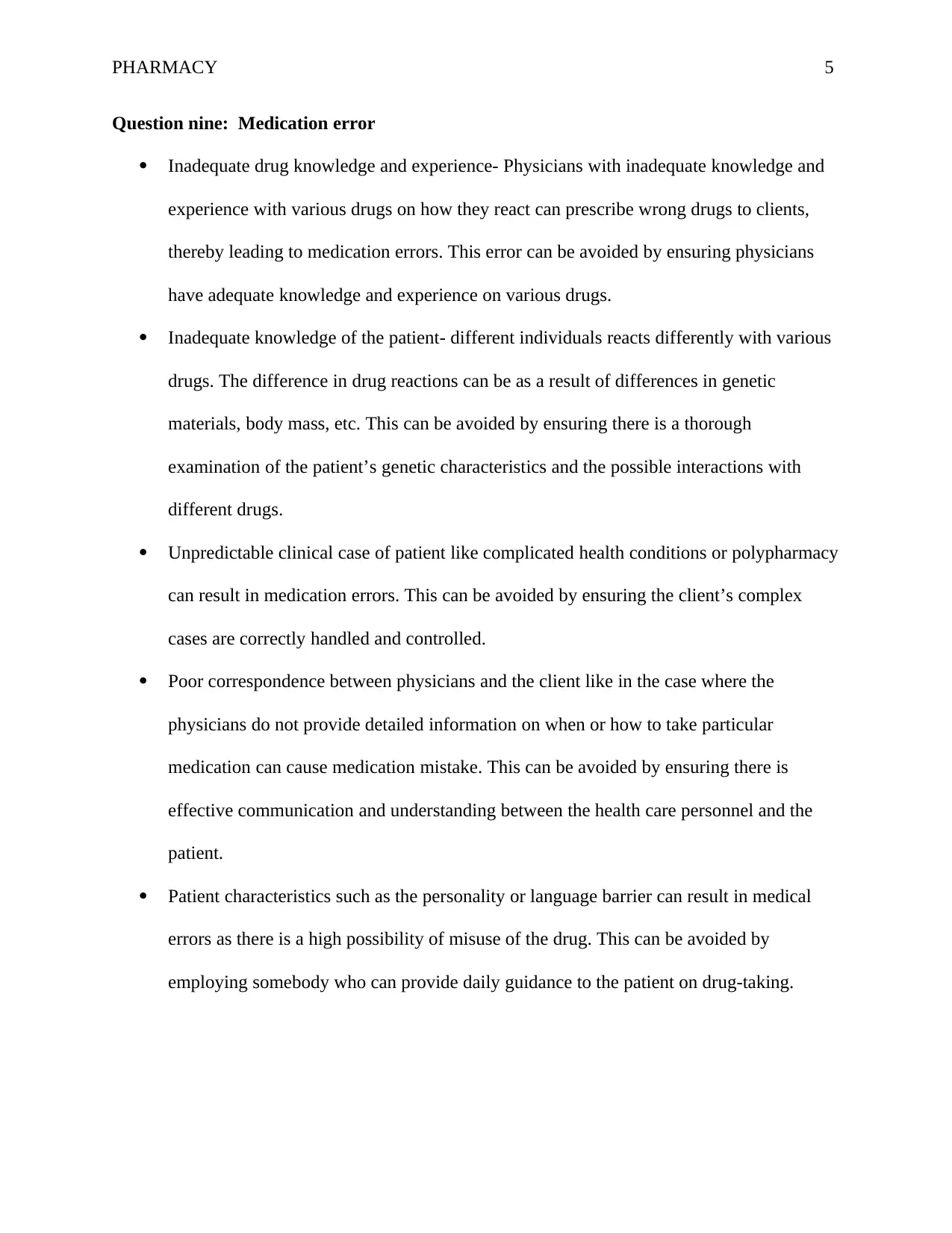
PHARMACY 5
Question nine: Medication error
Inadequate drug knowledge and experience- Physicians with inadequate knowledge and
experience with various drugs on how they react can prescribe wrong drugs to clients,
thereby leading to medication errors. This error can be avoided by ensuring physicians
have adequate knowledge and experience on various drugs.
Inadequate knowledge of the patient- different individuals reacts differently with various
drugs. The difference in drug reactions can be as a result of differences in genetic
materials, body mass, etc. This can be avoided by ensuring there is a thorough
examination of the patient’s genetic characteristics and the possible interactions with
different drugs.
Unpredictable clinical case of patient like complicated health conditions or polypharmacy
can result in medication errors. This can be avoided by ensuring the client’s complex
cases are correctly handled and controlled.
Poor correspondence between physicians and the client like in the case where the
physicians do not provide detailed information on when or how to take particular
medication can cause medication mistake. This can be avoided by ensuring there is
effective communication and understanding between the health care personnel and the
patient.
Patient characteristics such as the personality or language barrier can result in medical
errors as there is a high possibility of misuse of the drug. This can be avoided by
employing somebody who can provide daily guidance to the patient on drug-taking.
Question nine: Medication error
Inadequate drug knowledge and experience- Physicians with inadequate knowledge and
experience with various drugs on how they react can prescribe wrong drugs to clients,
thereby leading to medication errors. This error can be avoided by ensuring physicians
have adequate knowledge and experience on various drugs.
Inadequate knowledge of the patient- different individuals reacts differently with various
drugs. The difference in drug reactions can be as a result of differences in genetic
materials, body mass, etc. This can be avoided by ensuring there is a thorough
examination of the patient’s genetic characteristics and the possible interactions with
different drugs.
Unpredictable clinical case of patient like complicated health conditions or polypharmacy
can result in medication errors. This can be avoided by ensuring the client’s complex
cases are correctly handled and controlled.
Poor correspondence between physicians and the client like in the case where the
physicians do not provide detailed information on when or how to take particular
medication can cause medication mistake. This can be avoided by ensuring there is
effective communication and understanding between the health care personnel and the
patient.
Patient characteristics such as the personality or language barrier can result in medical
errors as there is a high possibility of misuse of the drug. This can be avoided by
employing somebody who can provide daily guidance to the patient on drug-taking.
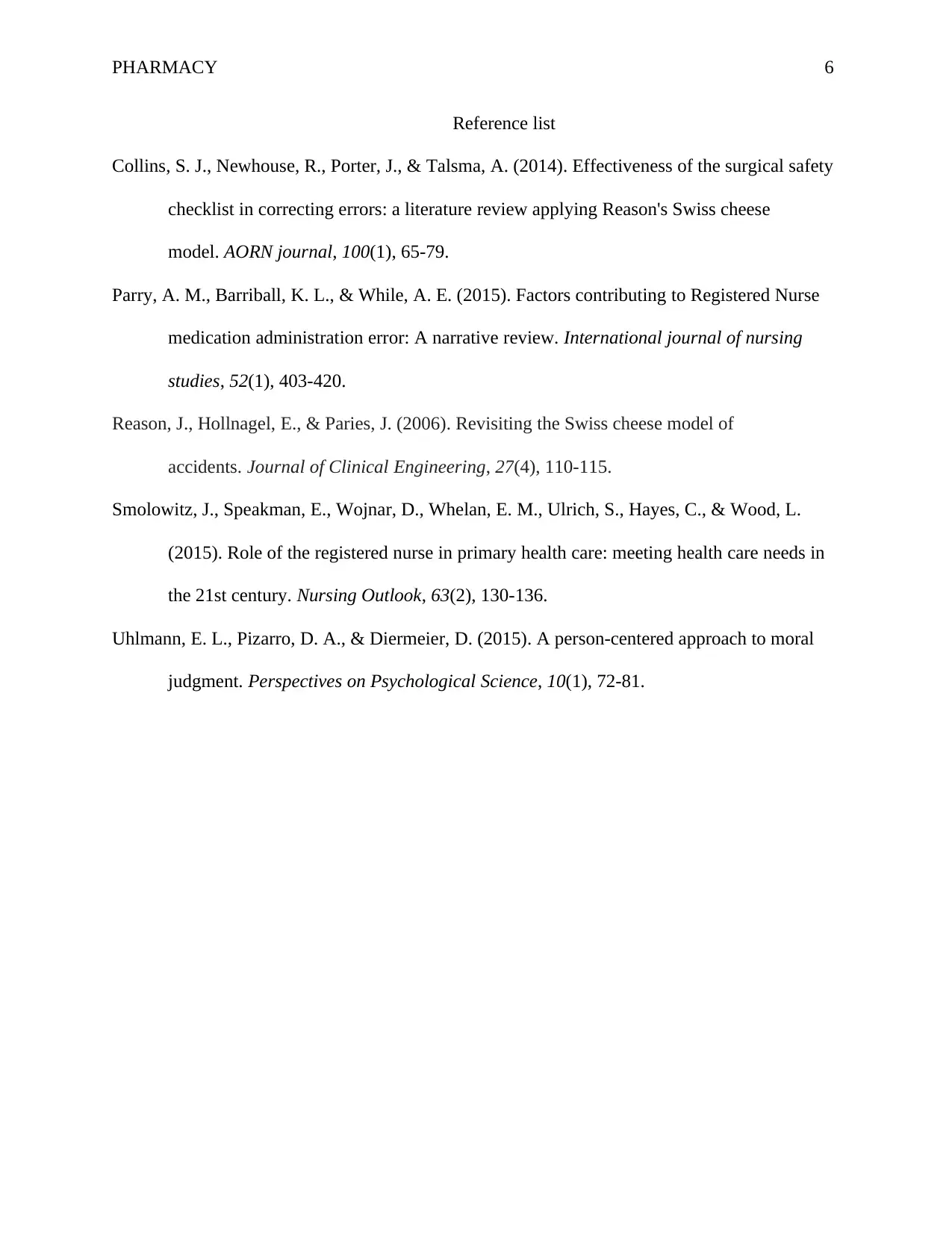
PHARMACY 6
Reference list
Collins, S. J., Newhouse, R., Porter, J., & Talsma, A. (2014). Effectiveness of the surgical safety
checklist in correcting errors: a literature review applying Reason's Swiss cheese
model. AORN journal, 100(1), 65-79.
Parry, A. M., Barriball, K. L., & While, A. E. (2015). Factors contributing to Registered Nurse
medication administration error: A narrative review. International journal of nursing
studies, 52(1), 403-420.
Reason, J., Hollnagel, E., & Paries, J. (2006). Revisiting the Swiss cheese model of
accidents. Journal of Clinical Engineering, 27(4), 110-115.
Smolowitz, J., Speakman, E., Wojnar, D., Whelan, E. M., Ulrich, S., Hayes, C., & Wood, L.
(2015). Role of the registered nurse in primary health care: meeting health care needs in
the 21st century. Nursing Outlook, 63(2), 130-136.
Uhlmann, E. L., Pizarro, D. A., & Diermeier, D. (2015). A person-centered approach to moral
judgment. Perspectives on Psychological Science, 10(1), 72-81.
Reference list
Collins, S. J., Newhouse, R., Porter, J., & Talsma, A. (2014). Effectiveness of the surgical safety
checklist in correcting errors: a literature review applying Reason's Swiss cheese
model. AORN journal, 100(1), 65-79.
Parry, A. M., Barriball, K. L., & While, A. E. (2015). Factors contributing to Registered Nurse
medication administration error: A narrative review. International journal of nursing
studies, 52(1), 403-420.
Reason, J., Hollnagel, E., & Paries, J. (2006). Revisiting the Swiss cheese model of
accidents. Journal of Clinical Engineering, 27(4), 110-115.
Smolowitz, J., Speakman, E., Wojnar, D., Whelan, E. M., Ulrich, S., Hayes, C., & Wood, L.
(2015). Role of the registered nurse in primary health care: meeting health care needs in
the 21st century. Nursing Outlook, 63(2), 130-136.
Uhlmann, E. L., Pizarro, D. A., & Diermeier, D. (2015). A person-centered approach to moral
judgment. Perspectives on Psychological Science, 10(1), 72-81.
⊘ This is a preview!⊘
Do you want full access?
Subscribe today to unlock all pages.

Trusted by 1+ million students worldwide
1 out of 6
Related Documents
Your All-in-One AI-Powered Toolkit for Academic Success.
+13062052269
info@desklib.com
Available 24*7 on WhatsApp / Email
![[object Object]](/_next/static/media/star-bottom.7253800d.svg)
Unlock your academic potential
Copyright © 2020–2026 A2Z Services. All Rights Reserved. Developed and managed by ZUCOL.





